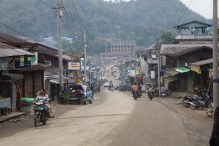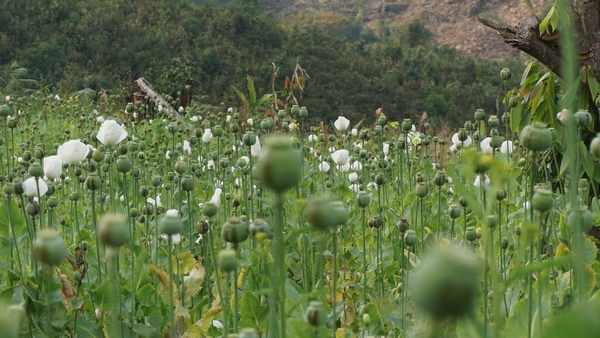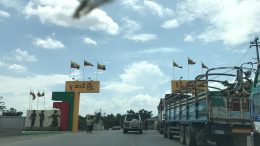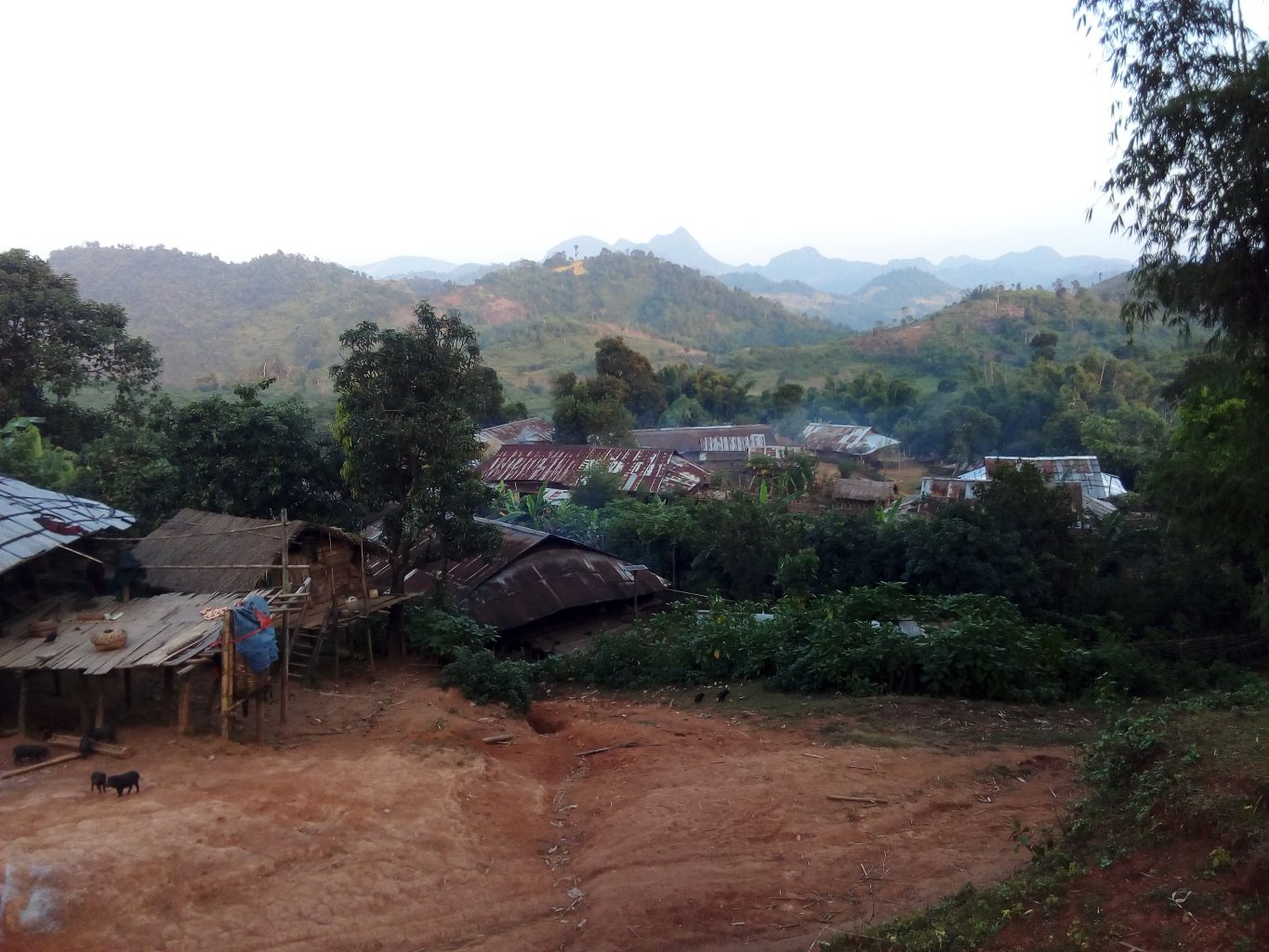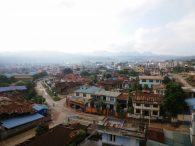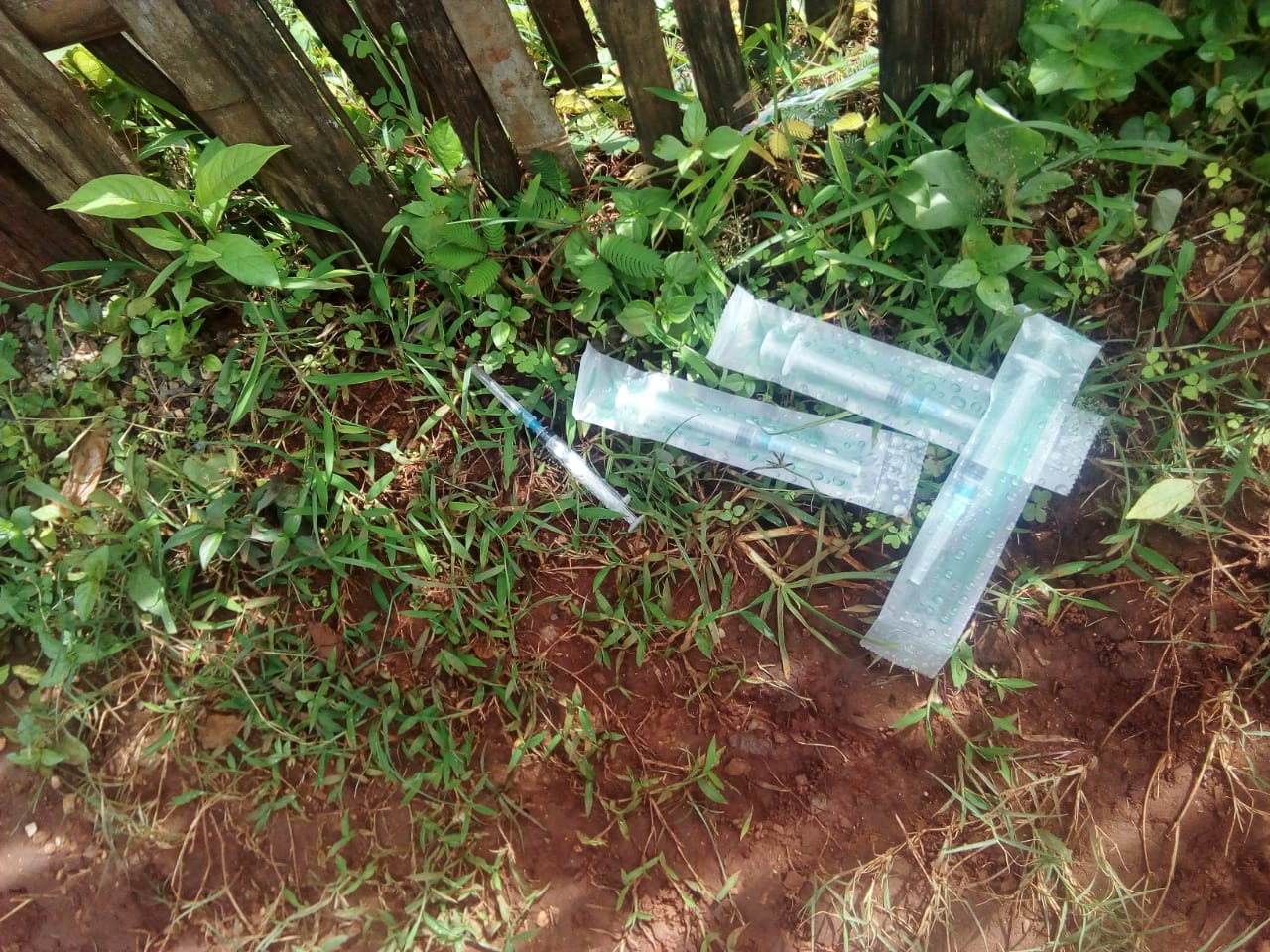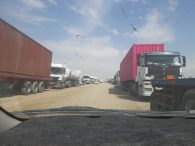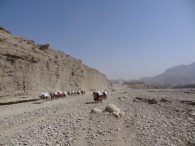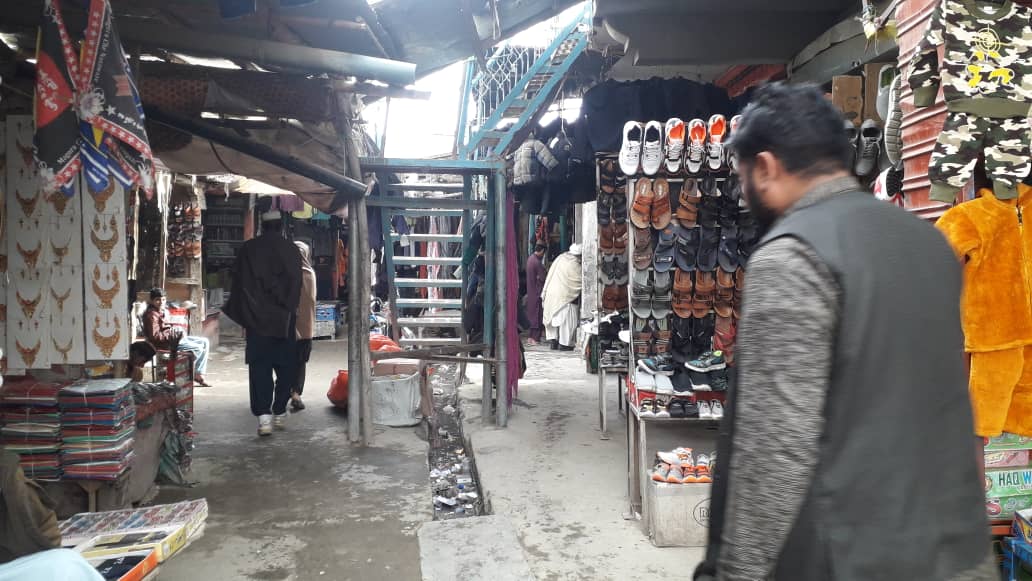I’ve always lived in the Sierra Nevada. My parents were settlers who arrived in the ‘50s at the time of bipartisan violence. My dad came from Santander when he was 13 or 14 years old and got a job in Vista Nieve, one of the coffee haciendas boosting the economy in the Sierra at that time. He worked on that farm for several years until someone told him that they were giving away land in Ciénaga. It was far. It took 11 hours walking to get there. My dad went, and the locals told him: ‘as far as the eye can see, that land is yours.’ After walking along the edge of the mountain, my dad marked the land he wanted. It added up to around 150 hectares. The land was his because, at that time, people respected whatever piece of land you chose.
Towards this side of the Sierra, there was nothing. It was all virgin mountains. To clear the land and build his farm, my dad worked in the Vista Nieve hacienda for a little longer. From there, they brought different kinds of banana shoots and coffee seeds to plant. Although the haciendas didn’t want to give away their coffee seeds, the land was fertile and the coffee grains fell to the floor, so there was virtually a seedbed under the crop. My dad told us that he and his friends went to the hacienda at night and collected the coffee seeds to plant on their farms. They carried them home on their shoulders – there wasn’t even a proper path back then, just a trail.
Around that time, my father met my mother, who was also the daughter of settlers. After a while, they decided to stay here and finish building the farm. First, they built a tiny house on the high ground, but it was too breezy, and the house fell apart. So, they decided to rebuild it on the lower part of the farm. My nine siblings and I were born there. Eventually, other families began to settle nearby too. We had more and more neighbours every day. They decided to call the hamlet Canta Rana because there were many frogs in the area, and they didn’t let us sleep at night with all their singing.
I spent the first years of my life surrounded by coffee bushes. That’s why I say I’m a coffee grower from birth or, rather, from the cradle.
I remember that there was only one variety of coffee in the Sierra, arabica, which produced tall trees and large grain. It lasted for many years, but it wasn’t that productive. And since there were good and not-so-good years, many people hesitated about whether to continue cultivating coffee.

My dad never stopped: he continued to grow coffee year after year. But others stopped looking after their coffee crops when they started to grow marijuana.
At the beginning of the ‘70s, anyone caught with a marijuana plant was tied up and handed over to the police. But by the time I was aware of the issue, a few years later, we were in a marimba [marijuana] bonanza, and practically everyone was in the business.
The most productive region at that point was La Reserva: there were marijuana plants wherever you looked. It was a sparsely populated area, and it was not easy to get there. It took four or five hours by foot from our farm. Not even the mules could cross that trail. So the axes, the machetes, the food, everything had to be carried on people’s shoulders. Only a few families lived there, growing coffee. Since they owned the land, they began leasing parcels to people who came to the Sierra to cultivate marijuana. They told them, ‘I lend you the land, and you give me four hundred pounds of marijuana per hectare.’
Four of my brothers had marijuana crops. They managed to plant almost seven hectares altogether. Most of the crops were like theirs, small. But my brothers were a little more independent. Unlike the settlers, who arrived with virtually nothing and had to find a ‘sponsor’ because maintaining a crop for several months was expensive, my brothers already knew the region and had tools and mules. In short, they already had what it takes to clear a few hectares and plant a crop. And since several of them were working on it, they didn’t need to hire more hands.
It all started by clearing a bit of land. People had to do it with an axe because there were still no chainsaws in the area back then. At that time, the weather was orderly, not like now, and you knew that it rained in April. So, my brothers burnt the land and started sowing in early April. Since the soil was very fertile, maintaining the crop was easy. It didn’t need fertilisers or anything, just cleaning from time to time. They would go up there for 10 or 15 days, and then they would come back to the farm. After a few months, the crop was ready to harvest. They cut all the bushes to collect the buds. Then, they stored everything near a creek in the forest where no one could see it. They piled the marijuana up in a shed they had built.
My brothers would wait for prices to go up, and when they had negotiated a reasonable amount, they transported the weed from their caleta [hiding place] to the mafia’s collection centres. That’s when I would help them. I was a boy, seven or eight years old, and I herded their mules. They paid me to look after them. I did many things like that.
Peasants would go to the collection centres where the marijuana would be weighed, and they were paid accordingly. The mafiosos paid everyone right away: the carrier, the worker, the cook. Then the bundles of marijuana that the peasants had brought were packed into fique sacks and converted into compact bales using a hydraulic press.
The mafiosos kept the weed in the collection centre for a while until they decided it was a good time to move it. Since we had mules, we would go there and wait for work. Sometimes we took it down to the road to be loaded onto trucks. Other times, we took it directly to a beach or an airstrip. The trip could take up to three or four days. It was hard because the area is dry, and I felt thirsty all the time. When the buyers came, they paid everyone according to the number of mules they had: ‘How many mules? Here’s your money.’
At that time, money flowed freely. Marijuana was more profitable than coffee.
And those who had no cash could quickly get someone to finance the planting of a marijuana crop. Some of my friends, who came to the region as coffee pickers, set up marijuana crops and made up to ten million pesos, which was a lot of money at the time. But they spent it all. Many peasants were not used to handling so much money, and since everyone believed that the bonanza would never end, they wasted it. Only a few decided to invest in their farms, buy a house or fix up their beneficiadero – the place for processing the coffee harvest. Of course, those wealthy families who got into the business already knew how to handle money. They invested in land, cattle and banana crops in the flatlands.
The bonanza didn’t last long. My brothers only managed two harvests. In the early ‘80s, it all got complicated. There were years when nobody was buying weed at all. Many people sold their harvest on credit and ended up losing everything; the buyers never paid them. Then, the government decided to fumigate the crops with glyphosate.
In addition, things became very violent. This was another reason some people stopped cultivating marijuana. Theft was common, so the mafia formed ‘combos’ or small groups of armed men, who they paid to guard the caletas and transport routes. But different combos ended up fighting each other, and anybody could be killed for their harvest, money, even their mules. There was violence all around. Everybody was armed. To be in the marimba business, you had to have a gun.
So, the bonanza ended, and we all had to go back to coffee.
Few people had cut down their coffee crops to grow marijuana, but we had to build the farms again because they were neglected during the bonanza. And by then, conditions were even more difficult. The environmental damage caused by the crops and the fumigations was noticeable. Also, armed groups had established themselves in the area.
The first time I saw the guerrillas, I was eight years old. Two armed guys and a young woman came to chat with my dad. My father sent me inside because children were not allowed to talk to adults in those days. Soon, local people were hanging around with them. With time, they were no longer four or ten rebels but a whole army. And, gradually, we got used to seeing them around. Many people my age got involved in that story. They invited me to join them, but, thank God, I never had that madness. Many of my friends and neighbours left to join the insurgency and died quickly.
When the guerrillas arrived, the first thing they did was to finish off the combos and ban marijuana crops in the region. I remember that, on the same day, they eliminated two combos, one in Nueva Granada and one in Parranda Seca. They also purchased guns from people; many peasants were armed. So they started to gain credibility because security improved in the area. They also spoke about social change in the country and encouraged us to form community action committees and organise ourselves – collectively – within the villages. Roads and other things in the region improved as a result. I remember that community leaders were encouraged and went to the city halls to demand resources. It wasn’t as dangerous then as it became in the ‘90s.
The guerrillas set the rules: you couldn’t go out at night; roads had to be clean; you had to attend meetings they organised.
We had to obey their orders, but we could still work, and governmental entities could still visit the zone. For example, the Coffee Growers Committee was able to come to the region and support the community. It was like that until the guerrillas killed one of their workers who provided technical assistance to the coffee growers. After that, they stopped coming so often.
Over time, the guerrillas’ authority became stronger. We had to do whatever they ordered. They became more and more powerful every day until they were the lords and owners of the whole territory. In the beginning, when you saw the guerrillas, you weren’t afraid of them. They came to your house, and it was normal. If you had something to offer them, it would be welcome. If not, there wasn’t a problem. Later, they began to turn against those who wanted to earn more from their farm work, forcing them to contribute money or leave. They began to ask for the so-called ‘vaccines’, that is, to charge a fee that you had to pay with cash, animals, or something else. So, on top of everything – poor harvests and low prices – coffee farming families had to give what little they earned to the guerrillas.
Later, other guerrillas arrived, and each group had its own rules. And of course, if you paid one group, you also had to pay the other!
In other areas, some combos grew stronger and became paramilitary groups. The division of the territory between different groups made life really difficult. Family and friendships were broken. Hatred grew among people from different regions of the Sierra. Those here said people from over there were paramilitaries, and those there said people from here were guerrillas. Before, we could visit our relatives in other towns, but when the conflict began, they forbade people from there to come here and those from here to go there. When we had to run an errand in the city, we had to go incognito without letting ourselves be seen.
Everything got even worse when the paramilitaries arrived in our area. That’s when our ordeal truly began.
One day they came to my farm and stayed overnight. They stole everything from us. They left us without anything to eat and without anything to eat with – they even took our spoons! They said they would be back in a month, so we were practically waiting for them when they came again. The first ones arrived one day in the morning and locked us in the house. By noon, there were four or five hundred of them. We were kidnapped for almost a week, and we could only eat what they gave us.
The paramilitaries and the guerrillas started fighting. We could hear gunfire every day. Then the army arrived, and we were trapped between the paramilitaries, the military and the guerrillas. We were terrified. You never knew when you, your relative, or your neighbour were going to be killed.
I thought about leaving many times. In 2002, I felt I couldn’t take it anymore, but they wouldn’t let us go. If I went down the mountain, then my wife and my children had to stay. They had this rule that only one member of a family could go down the mountain. We couldn’t work for almost a year. Nobody was allowed to come up. The coffee crops were nearly lost. And they ate or took away the few animals I had.

Eventually, the paramilitaries took control of the region and drove the guerrillas out. Overnight, we went from being a guerrilla zone to being a paramilitary zone. The paramilitaries came with their own rules, and you had to comply with them. Like the guerrillas, they also took money from us, but it was even worse because they charged per hectare. Also, since they came from a coca-growing area, they wanted to replicate that here.
People hadn’t been involved in the drug business since the marijuana bonanza. Once, a group tried to grow poppy plants in the highlands, but four people were killed in a year, and the guerrillas imposed a ban, just like they had done with marijuana. But then the paramilitaries gained ground. They would approach people and say: ‘Look, you have good land to grow coca, and we can finance you. Take this two or three million and start planting’. Because of the economic crisis, and under their command, many of us began to plant coca.
First, the paramilitaries brought seeds. But later, since they wanted the crop to grow faster, they brought shoots. And since coca is so resistant, we carried the little plants up the mountain on our shoulders – it took us three or even four days walking. We planted them in the shade, and they started growing quickly. When the leaves were ready to be harvested, the paramilitaries sent some expert guys to teach us because nobody from the area knew how to raspa. They were like machines, very fast to collect the coca leaves. What we called ‘cooking the leaves’, that is, mixing the leaves with chemicals to make coca paste, came later. The paramilitaries sent an expert in chemistry, and he explained how to use the stuff.
Coca cultivation had just started to take off when the paramilitaries demobilised.
The paramilitaries set up a collection centre in La Tagua. From there, they amassed all the coca paste produced in the region and supplied us, producers, with everything: food, tools, and chemicals. Of course, it was the only place where we were allowed to sell. The rule was that we could only sell to them. So we took the coca paste there, and the buyer paid us, discounting what we had asked for in food, chemicals, and the like.
We didn’t have experience with coca, so I decided to plant a hectare of it, but also one of coffee. I thought, ‘well, if it doesn’t work, then I will still have the coffee’. And so it was, because the coca boom was shortlived, around two years. I only managed to harvest twice. Coca cultivation had just started to take off when the paramilitaries demobilised. And since no illegal armed groups were left here, the authorities and the government army arrived, saying that whoever had coca crops had to destroy them immediately. Since most crops were still small, it was easy, and we put an end to that story.
By then, people in the region were enthusiastic about organic and special coffee. The idea emerged in the middle of the conflict, but it was stagnant for about seven years. We needed to associate with others for the plan to work, to form coffee growers’ associations. But just when the project was taking shape, the paramilitaries started killing the association leaders. So we all got scared. We started over again when the demobilisation began. At that time, we only had the Ecolsierra Network. Today there are more than 12 associations.
There is still a lot to do in the region. After the demobilisation, security did improve, but we have a development delay of about 15 years
The associations have helped raise coffee growers’ quality of life because the extra money from organic coffee can be invested in farms, housing and social programmes. But it isn’t enough to cover the region’s needs. Our roads should already be paved, but they are terrible, and we lose a lot during the harvests as a result. We need more support from the authorities. Before, the mayors and governors didn’t come to the region, supposedly because there were guerrillas here, later because there were paramilitaries here. Now, none of these groups are around, but they still don’t come. Coffee has great potential here, but the conflict slowed us down. Most of those who didn’t die left the region. Those of us who stayed are still struggling.


